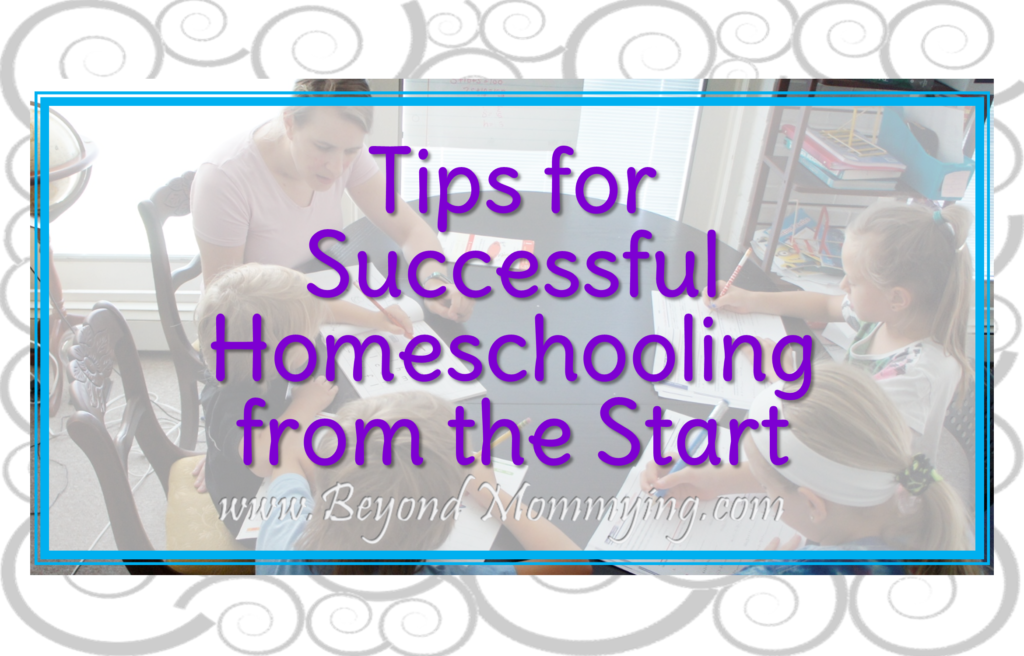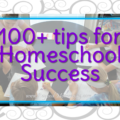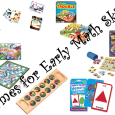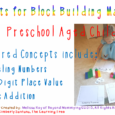It’s kind of hard to believe that we’ll be starting our 7th year of homeschooling this fall. And with Pipsqueak turning 5 in September and starting kindergarten, it will be the first year all 4 kids will be doing formal school. And now I have two middle schoolers. And next year we’ll be starting high school. And even after all this time, it can still feel big and overwhelming!
Note: This post contains affiliate links meaning if you click any product link and make a purchase, Beyond Mommying may receive a small commission which is used for the upkeep of the website; however, it will not affect your purchasing experience in any way. Read more about our use of affiliate links.
I’ve made a lot of mistakes. And made a lot of changes. But I have also learned a few things over the years that have helped me to ensure our homeschool success.
Other helpful homeschooling posts: Elementary Secular Homeschool Curriculum • My Favorite Resources for Teaching Early Reading Skills • Using the Common Core to Guide Your Homeschool Curriculum • What You Need to Homeschool: Tools for Homeschool Success • Different Ways for Managing and Keeping Homeschool Records
10 Tips for Successful Homeschooling from the Start
Homeschool is not traditional school at home
I was raised in public schools. My husband was raised in public schools. My father-in-law works in public schools. We have countless friends that are public school teachers. Which made it very easy to have a skewed idea of what education should look and feel like.
But that idea is wrong. Homeschool should not take 7 hours a day. Homeschoolers do not need to sit at a desk or table for 30-40 minutes at a time for each subject. You don’t need any kind of dedicated homeschool room or space more than a place to store your materials. In fact, a lot of homeschooling doesn’t even happen at home.
The only thing you really need to homeschool is Flexibility
I can’t tell you how much stress, worry, and frustration this little tidbit would have saved me in the beginning if someone had only told me.
Schedule isn’t working? change it.
Curriculum isn’t cutting it? get something else.
Kid isn’t getting it today? walk away.
You just don’t feel like doing it right now? that’s ok.
Need a break, change, or do-over? take it.
Being open to changing anything and everything as your family evolves is so, so, so important! My homeschool looks vastly different from 7 years ago. And very different from even 6 months ago. We’re constantly adjusting our schedule, expectations, and curriculum as we go. And the more comfortable I’ve gotten with accepting change, the more smoothly our homeschooling has gone.
You don’t have to do it all
In a traditional school program, children are given instruction in the four core subjects (math, english, science, social studies) as well as numerous extras like gym, music, art, dance, foreign language, technology, etc. And while there is nothing wrong with any of those things, it’s ok to not teach all of them all the time.
In fact, my girls didn’t start regular social studies/history work until our third year homeschooling (which is when I initially developed the Big Ideas through History program and my South America Unit Study). And we gave up on formal science within the first few months and didn’t restart it until my eldest daughter was in middle school(!) But…that doesn’t mean they weren’t learning these topics.
So many subjects can be learned without a formal curriculum simply by reading, watching educational shows, visiting museums and zoos, researching topics as they come up, and having regular, open ended conversations. When we did start formal social studies and science, I was pleasantly surprised by how much my kids already knew just from living life.
There is no right or wrong way to homeschool
Let me say that again: there is no right or wrong in homeschooling, only what works for your family at that time. The curriculum that works for your neighbor might not be a good fit for you (likely, it won’t be). The schedule your friend from high school uses might not meet your family’s needs (probably, it won’t). The expectations your public school puts on its students might not be what your kid needs to succeed in life (every child is uniquely individual).
Every family comes to homeschooling with its own set of needs, ideals, and goals. There will never be a one-size-fits-all solution, we all need to support each other along our individual journeys.
Get very comfortable and familiar with the rules
While there is no right or wrong way to homeschool, each area has their own homeschooling laws, regulations, and restrictions and as a homeschooling parent, is your job to know, understand and follow those laws. They are not guidelines or recommendations, they are legal mandates and not following them precisely can result in being accused of truancy and any legal ramifications of that.
However! School districts all over the country are notorious for overstepping the bounds of what they can legally require and have been known to resort to threatening tactics to try to get families to comply an you should always be careful of adhering to requests that fall outside the legal regulations governing homeschooling in your area. Which is why knowing the rules for your specific situation is crucial.
There is a ton of misinformation out there on the legalities of homeschooling and with the wide range of regulation, I highly recommend joining a local support group of some kind (virtually on Facebook, for example, or in-person) to get answers to any legal questions you may have from those who have personal experience.
Keep track from the start
One of my biggest pitfalls as a homeschooler even after all these years is not keeping track of work as my children complete it. Because we’ve never lived in a state where we’ve had to record attendance or submit progress reports, I have a tendency to forget to write things down and then end up having to try to remember and compile the information later. Not a homeschooling plan I recommend!
A few things that have helped me keep organized are writing dates on workbook pages as they are completed (and teaching my older kids to do the same), keeping everything organized for all the kids in one place (this planner works perfect for our family), and actually using the Homeschool Portfolio and Record Keeping Sheets I created. My system has evolved over the years (see all the different ways I’ve kept records), and I’m sure will continue to change as my kids grow.
The two most important questions to answer before picking curriculum:
Secular or Christian?
Screen or book?
There is a ridiculous amount of curriculum options out there. And it can quickly become overwhelming to try to pick something. But answering the two questions above, along with setting a realistic budget, will greatly reduce the number of options to research.
A note about: Secular vs. Neutral vs. Christian
Because many families throughout time have chosen to homeschool for religious reasons, a good majority of the most well-known and popular homeschool curriculums are based on a Christian worldview. Some non-christian homeschoolers can overlook or skip religious aspects in their curriculum, but many, including my family, choose not to and only use purely secular programs (see my list of favorite secular elementary programs).
There is also a sort of middle ground group of resources calling themselves “neutral” that are not outwardly religious, but often don’t teach evolution, the big bang theory, climate change, and other controversial ideas or topics that may conflict with ones religious views. If you want a truly secular program, steer clear of “neutral” programs and those that are called secular, but published by a christian publisher (the one exception is Voyages in English which is 100% secular and a favorite program of mine.)
Secular, Eclectic, Academic Homeschoolers is a fantastic, resource for all things secular homeschooling and they have a huge, active Facebook group as well.
All-in-one is not always best
I have never used an all-in-one homeschool curriculum. The biggest reason is because there are few secular options, none of which have appealed to me, and also because all-in-one programs come with an all-in-one price. And because I want to have the flexibility to change if something doesn’t work, I choose not to invest large amounts of money in programs I’m not 100% sure about. I also hate being wasteful so prefer to pick-and-choose the program components that we will actually use.
Homeschooling doesn’t have to be expensive
We, as a family, prefer book-based programs and I tend to go with affordable workbook based programs. But when textbooks are necessary, I have always bought them used from sellers like AbeBooks and in the process saved hundreds (sometimes on a single book!)
I’ve also learned through time that the amount of school supplies you actually need is pretty small. The things we use daily include:
- pencils and erasers
- markers, colored pencils, or crayons (depending on student’s age)
- small dry erase boards and markers (I prefer lined boards and these markers are the best we’ve used for the price)
- large dry erase board or poster (I love this poster we have).
Because we use mostly workbooks, my kids never saw loose-leaf lined paper before starting pre-algebra this year. In the past, when we needed paper for assignments, we used various styles of notebooks (composition, spiral, notepads, etc).
Get social
I’ve discussed the myth of homeschooler’s lack of socialization before, but that doesn’t mean you don’t have to put a little effort into developing and maintaining relationships outside your family (for both your kids and yourself!) If you child is involved in extra-curricular sports or activities, that is often enough. You can also look into local homeschool co-ops, or informal meetup groups (again, local Facebook groups are a great place to start). And many museums, zoos, nature centers, and extra-curricular providers also provide special day-time programs specifically for the homeschool community.
Taking on homeschooling can be extremely intimidating, but taking a few simple steps in the beginning can make a huge difference!
Have any other specific questions about homeschooling? I’m here to help! Feel free to reach out.








